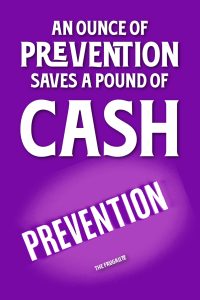(Psst: The FTC wants me to remind you that this website contains affiliate links. That means if you make a purchase from a link you click on, I might receive a small commission. This does not increase the price you’ll pay for that item nor does it decrease the awesomeness of the item. ~ Daisy)
By the author of the FREE online course Growing Self-Sufficiency: The Whole Picture
Well, the old saying used to go, “An ounce of prevention is worth a pound of cure.” I find that when problems come up, however, they usually cost me! So, in these challenging times we are facing, I thought I would share some simple and low cost/free ways that I prevent problems in my modest homestead. While sometimes it is admittedly difficult to actually calculate the amount of money saved from things that don’t actually happen, I hope you will still see my point. Even better, if you get a bit of inspiration and are able to share your own “ounces of prevention” with the Frugalite community, all the better!
Keeping Safe with a Woodstove
There have been a surprising number of house fires in our rural township in the past few years. A woodstove is always a potential source of danger. Although money is tight, I never skip my annual chimney cleaning by my professional technician. He has over 30  years of experience in the biz. He told me this fall that he can tell what people are burning from the amount and qualities of the creosote he brushes out.
years of experience in the biz. He told me this fall that he can tell what people are burning from the amount and qualities of the creosote he brushes out.
You might think that you’re saving a trip to the dump by burning your garbage in your woodstove, but is it worth risking an expensive chimney fire or house fire? The same with burning green wood, which my technician told me was responsible for a big chimney fire in the neighbouring village.
Other preventative habits I have include ensuring my fire gets a good start and is never smoldering. This requires good kindling and properly dried wood.
I’m even cautious about what I’m wearing when I open the woodstove door: no highly flammable housecoat on, hanging where a log could fall out on it. I have heard of horrifying accidents that have occurred when a log fell into the home. Plastic-based clothing like polyester can be quite flammable. I take extra precautions when opening my stove. I am ready for anything.
Canadian Winter Safety Kit
While I live in a rural area and choose to drive a relatively small car, there is one thing that I don’t hesitate to spend on for my winter safety: top of the line winter tires. Do I pay full retail? Heck no! But these are so important that I would even buy them on credit if I needed them. Would I even take a short drive out in the snow without them? Nope. And you will also find in my car a shovel, multiple bags of sand and salt, and numerous survival items, too.
Along with all of this safety equipment on and in my vehicle, my style of winter driving is also a preventative. I slow down. Yes, you read that right! I SLOW DOWN and drive more carefully. I am willing to cancel appointments if there is freezing rain coming (and we get more of that now). If someone is tailgating me on a highway, I am more than happy to pull over to let them by so that I can drive what I feel is my “safe speed.”
If that means I leave the two-lane highway and get back on, so be it. I’m okay with that. If that means that the drivers who all want to speed in the ice storm get angry with me, so be it. Over the years, I have become less concerned about their honks and angry gestures, feeling sad for them that they are in such a rush. If I thought there was a way to decrease the aggressive driving on our highways, I would try to help! The best way I have found so far is just to let them by with as little interaction as possible.
Tick Talk Tick Talk Tick Talk….
Ticks are now part of life in our rural area, and they seem to be getting worse. The prevailing wisdom used to be that you didn’t worry too much about an attached tick if it wasn’t round and full. That is because the “experts” believed that the dangerous diseases spread by the tick didn’t actually start spreading until after the tick had been attached for 24 hours or more. Not anymore.
In order to prevent scary diseases like Lyme disease, you don’t want any tick to bite you, ever. So, because I spend a lot of my time outdoors in our warmer seasons, I follow a strict Tick Bite Prevention Protocol every day. If I don’t look as fashionable while out in the garden, I’m not too concerned. I know someone whose husband was never the same after suffering with Lyme disease that wasn’t diagnosed in time. For him, the cost was permanent and severe: he suffered serious brain damage. In order to try and help as many people as possible prevent tick bites, I share a “How to Guide” on Tick Bite Prevention on my website. It’s totally free. You can find it here if you click on the link and scroll down. It is the sixth guide.
Why Not Save That Pound of Cash?
There are many free or low-cost habits that can prevent future problems. Could you see yourself trying any of the preventative tips offered here? Do you have your own “ounce of prevention” that you can share with us? Please tell us in the comments section.
About Colette
Colette is passionate about sharing her knowledge of thrifty living and self-sufficiency. She has developed her skills in self-reliance living in the suburbs, the city, and more recently, on her own Half-Acre Homestead. Colette lived five years completely off-grid and without running water in an eight by 24 foot tiny home while designing and building her own 18 by 24-foot eco-cabin. Her website, Half Acre Homestead is attracting followers from around the world who want to become more self-sufficient. Colette invites you to stop by the Homestead and check out all of the great resources including the practical How To Guides, A Tiny Home Resource Center and her organic gardening stories on her blog. She shares her wholistic model (body/mind/spirit) for achieving self-sufficiency in her Free Course, “Growing Self-Sufficiency: The Whole Picture.” Stop by the Homestead today to register free of charge!











17 thoughts on “An Ounce of Prevention Saves a Pound of Cash”
I agree completely with your advice here. Along with the woodstove advice, I want to remind people to check the area around their stove, both inside and out, paying special attention to any lengths of stovepipe. Even if it’s cold. Even if you don’t want to. Even if you aren’t sure what you’re looking for. Learn- it could save your life. I say this as someone who who lost her home before the age of 10, because of the stove pipe coming perilously close to cedar shakes. The place burned the ground.
Prevention really is important whether you are talking about dental health, auto maintenance, pest control, or what have you.
Hi Redbranch, I was so sorry to hear your story about your childhood home. That would have been both scary and sad at that age. I particularly appreciate your sharing that, as I often find that words of wisdom and warnings like yours do carry more weight when they come from someone who has lived through it. I agree about prevention! In fact, I am such a fan of it that there will be a follow up to this article coming fairly soon! As soon as I started thinking about prevention, I could see all the ways I try to live it in my own life. In my own experience, a lot of hassle can also be saved, too. I wish you a safe and happy home for your future!
sorry, that should have read “the place burned TO the ground.”
Here’s one of my main concerns when hauling stuff: is it tied down good enough? About 50 years ago, I lost my favorite chair off the back of a pickup. It was okay after some sanding, but the misery of it has stayed with me. Last year, we picked up some plywood at Lowe’s and didn’t tie it down. We lost the whole load in the street as we left the parking lot. Blessedly this was here in Texas, and immediately, vehicles stopped all around us and a bunch of men loaded it back up for us. It could’ve been much worse (none of it was damaged) and it didn’t land on another vehicle. We were careless but from now on, I intend to be intentionally safer.
Driving: I’m with you, Colette. I’m older now and usually not in such a hurry. All of the roads around us are only 2 lane, with speed limits of 65 or 70 m.p.h. I usually don’t want to go that fast, and never do at night when deer are out. If someone comes up behind me, I frequently pull off at the next wide driveway to let them pass.
Paying bills on time saves useless late fees.
Having food ready to eat in the refrigerator, saves huge dollars from the temptation to eat out. Some of my favorites to have ready are casseroles, tuna salad and egg salad for sandwiches, macaroni salad, etc. My husband has gotten really good at fixing a crockpot of chili ready for when we come home from church on Sundays. I never want to come home and cook and the chili has been wonderful. If our son is home, he makes vegetarian (Beyond Burgers and plenty of beans). It’s cheap and tasty.
Good and helpful article. I’m looking forward to the sequel.
Colette, I didn’t mean that you’re older. I know that you’re not nearly as old as I am. I didn’t realize how that sounded til now.
Red Branch, I’m so sorry about your house fire. Back when we were much younger, we had a chimney fire from burning green wood. Thank the Lord it didn’t catch the roof on fire but it was really scary seeing those flames licking out of the brick chimney up there.
Hi Carla, Ha ha ha! I am getting older and I don’t mind at all. I like to think of the wisdom I’ve gained, as it helps me write these articles!!!
Carla, I love your ounces of prevention! Speaking as someone who has hauled all kinds of improbable stuff on improbably small vehicles, I agree 100% about proper tie downs. Some good ratchet straps can be a lifesaver and don’t have to be all that expensive.
Thanks for your sympathy, it really did mark me. I remember it quite well. It happened when I was 6 and it’s been 39 years, but still a lesson that will teach me forever.
Hi Carla, What a great comment sharing your ounces of prevention. It sure is Murphy’s Law when things aren’t tied down, isn’t it? I remember losing a chair on a back country road right after I smugly said to myself, “See! I didn’t need to tie that down!” ha ha ha. I’m with you on the food in the fridge. I’m heading into the big city shortly to go to a seed sharing event. You bet I’ll have snacks and my lunch packed in the car! Thanks so much for sharing!
Saving a pile of cash is just part of a much larger process. You should think in terms of preserving whatever purchasing power such cash (or many other tradeable things) has (that is usually stolen from money by governments and central banks by counterfeiting such cash (in order to steal additional purchasing power to help fund welfare/warfare wealth sink holes … as has happened to every fiat currency over thousands of years.So how do you preserve (and potentially grow) that purchasing power?
Leaving it to rot in a bank (even at the pitifully tiny interest rates banks propose to pay you) should be largely limited to what’s needed to pay routine mandatory bills plus some emergencies. Beyond that … it can be useful to put much of the rest into non-counterfeitable forms of wealth such as precious metals, crypto currencies you can acquire and trade privately (once you learn how to do that with a non-custodial wallet that governments can’t confiscate), or gaining skills to increase your income generating ability, or income-generating businesses and real estate, or even barterable goods that you can trade, use, or sometimes even produce (the history of alcohol is a good teaching example) etc. BTW this is one of the most interesting ways to hold gold bullion overseas beyond your government’s ability to confiscate while being able to use it like divisible money via an international Mastercard:
https://glintpay.com/us
To expand on that alcohol example … at various times in history it has been made at home, used as medicine, used for entertainment, used as motor fuel in pre-1919 Model T Fords, and used as divisible and portable money.
This article touches on some of these issues:
https://internationalman.com/articles/doug-casey-on-surviving-and-thriving-in-the-coming-crisis-with-modest-means/
–Lewis
Hi Lewis, I sincerely wish I could invest in some gold bullion. I’m definitely with you on this one. I’m focussing mainly on my skills these days, like using alcohol to extract medicine from plants. Thanks so much for sharing these. I think the banks have already made enough money, already!!!
“Jack rabbit” starts and stops wear out tires a lot faster than smooth ones. I look well ahead at traffic lights to see if they have been green very long and am prepared to stop without hard braking. Then I make a smooth start rather than a fast acceleration. These simple things save tires and reduce gas consumption.
When there was a two day power outage in our town, a number of people were desperate for hot food and lighting. We had a teakettle and pan that could be heated over a kerosene lantern. Needless to day we had a supply of kerosene for this and also several lamps. We had hot food, hot coffee (instant which we weren’t too fond of but kept for just such times), and enough light to read by. Some people left town for the nearest place where there could get food and checked into motels there for lights.
We bought seasoned wood at the end of the season when it was slightly cheaper and had it extremely seasoned for the next year. We good a slight discount on chimney seeping since there was little buildup and it was a fast job.
HI Mary, This is a fantastic collection of ounces of prevention. Your story about the power outage really speaks to the power of preparedness. You didn’t have to leave town. You were safe in your home AND were able to monitor your home. I hope folks are taking notes. This simple list of what to set aside could save lives in some cases. Thanks for sharing, Mary. I’ll be looking for a discount from my own chimney sweep when I call him early this summer! Wish me luck!
I’ve sat with my parent to reschedule appointments when the weather was predicted to be bad – a couple days ahead of time.
For those who use space heaters, also be careful. It has been an unusually mild winter this year so thankfully no space heater related fires.
A visual of your chimney is a good idea – one time we saw a plastic bag was wrapped around cap of the pipe.
Ticks – treat your pets if in your budget. If not, tick check for them also – even if they are inside pets as ticks are hitchhikers. Encourage tick eating wildlife/poultry. Dress appropriately if in an area that is hospitable to ticks. But heck, a windy day and all bets are off sad to say. Mostly wood ticks here but we do have deer ticks.
An ounce of prevention is worth a pound of cure as they say.
Hi Selena, These are all great ounces of prevention. How scary to think of that plastic bag over your chimney! Thank you so much for sharing these with the Frugalite community!!!
“Jack rabbit” starts and stops wear out tires faster. A smooth start and gradual stop are a lot easier on them.
Some people who sell firewood reduce prices slightly near the end of winter. If you have a good storage place, you can season the wood even more for a clean burn and less likelihood of a chimney fire.
I too always get annual woodstove/chimney service & furnace serviced. Always get my wood in April/May so it’s stacked & seasoning for the winter. I’m trying to get a condo ready to sell – my friend passed away – and he never did much in the way of maintenance over 30 years. Consequently, the chimney failed (it’s a 50 yo condo), and will never be able to be used as regular fireplace again, due to major structural damage. So any ‘fixes’ (insert/gas fireplace) will be quite expensive :(. Has me thinking of what other things I need to be on top of in MY house! Thank you for your articles & everyone’s stories!
Hi Kelley, Wow! This was something I was NOT aware of. What a great share! I was sorry to hear about your loss of your friend. and I hope that you are able to sell his condo with minimum fuss. When my chimney sweep comes for his early sweep, I will ask him if there is anything else I need to do for chimney maintenance. I so appreciate your sharing this, as it truly underlines the point of prevention saving a pound of cash; perhaps in this case, it might be several pounds. Like you, this story has me taking a good look around at what I can do to maintain NOW, not later! Thank you, Kelley!